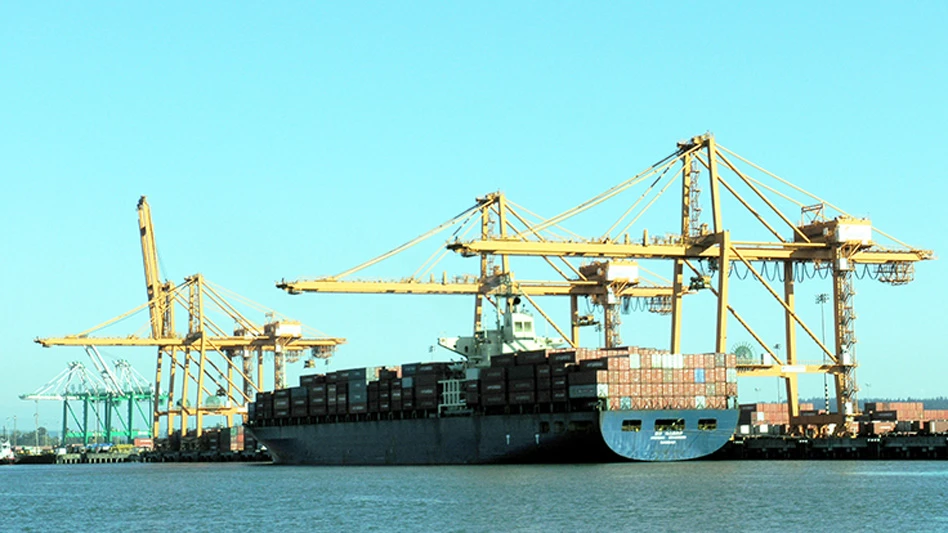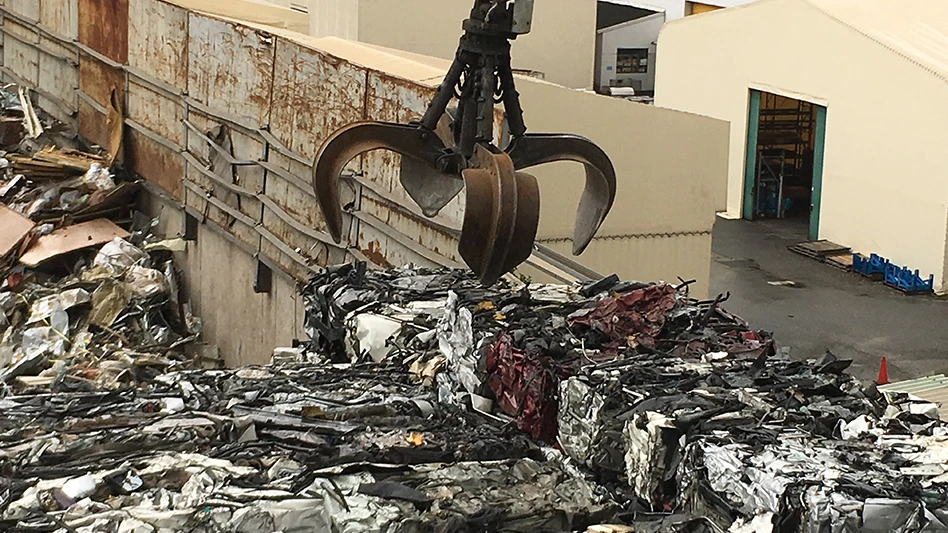Recycling obsolete electronics has offered a frontier available to willing pioneers, and few have blazed a more remarkable trail than Igor Boguslavsky, founder of Belmont Trading Co., Northbrook, Ill.
| THE BALANCING ACT |
|
Electronics recyclers such as Belmont Trading Co., based in suburban Chicago, are often engaged in a balancing act with customers who wish to dispose of obsolete equipment while balancing three different considerations: maximizing the return, practicing environmental responsibility and ensuring data security. According to Igor Boguslavsky, president of Belmont Trading, he and his associates must be certain to understand the needs of each customer on all three of these fronts. The company takes possession of a variety of off-lease and obsolete end-of-life equipment, including desktop and laptop computers, monitors, printers, scanners and "everything in between," according to Boguslavsky. The volume is significant, with Belmont’s Elk Grove Village, Ill., and Hayward, Calif., plants accepting some 24,000 units or assets per month. "In most cases, customers want us to obtain the best financial return, perhaps through the resale of units or tear-down of the units," says Boguslavsky. "With some systems, the value of components is higher than the value of the whole." At the same time, the other two factors are critical. Environmental compliance and avoiding the liability of an environmental misstep is key on the one hand, and "data security is also critical, so we offer them that assurance," says Boguslavsky, noting that Belmont offers a roster of data protection and destruction methods. |
As do so many entrepreneurs, Boguslavsky identified opportunities and made the decision to plunge into them and enter the world of business ownership.
In the ensuing two decades, he has poured his own energy into the growth of Belmont Trading and assembled a team of key people who have helped the company chart a global course that gives it a presence in several international markets.
SPANNING THE GLOBE
For a company that got its start in an apartment building in the Midwestern United States, Belmont Trading Co. has quickly established a global footprint.
The company’s organizational structure chart as of 2008 involves a series of interconnecting boxes and lines delineating operations or offices at 10 locations in five different nations.
"We strive to provide a global approach to recycling, not only servicing major markets but also helping our clients by setting up programs in smaller markets that normally get ignored," says Boguslavsky.
Belmont’s customers are drawn from throughout the chain of computer and telecom equipment makers and users. "Most of our business involves processing materials for OEMs, cellular operators and logistics providers," notes Boguslavsky.
His initial idea was not necessarily to be global in nature, but he has found it to be a key to attracting and retaining customers. "Some of the growth was planned and some of it has been because we’re willing to adapt," says Boguslavsky.
Belmont maintains considerable operations in the Chicago area, but Boguslavsky is quick to point out that neither he nor his key associates can effectively manage the company without continually connecting with the global market.
"A good part of our ability to adapt involves getting information from the field, by being there with the customers in their facilities and understanding the trends," he notes. "A lot of that comes not just from me but from our people in the field in Latin America and Europe. They’re the ones to tell us about trends and changes. It’s really about being out there and seeing what’s happening out there."
Boguslavsky and his associates, such as Vice President of Sales and Marketing Annette Roccapalumba and Latin America Business Development Manager Consuelo Velarde de Tremmel, log considerable air passenger miles in their pursuit to keep Belmont in touch with the market.
"You would have thought that with the advent of teleconferencing and other electronic communication you could travel less, but we find it is the opposite," says Boguslavsky. "The speed of business is increasing rapidly—you can’t make an assumption anymore because things change so quickly. So our people are always on the road visiting customers."
"Face time is still really important," agrees Roccapalumba.
Quickly assessing and analyzing what is happening in the field is the next step. "It’s a matter of what you do with the information," says Boguslavsky. "You can either hide your head in the sand and pretend changes aren’t happening, or you can address the changes."
The global nature of Belmont’s operations means attention has to be paid to both of these management aspects.
TURNING UP THE VOLUME
In its 20 years in business, Belmont Trading has grown both in its geographic spread and in the range of services it offers to customers.
Much of the company’s business has an asset management aspect to it, but Belmont Trading also handles end-of-life items that must be collected to fulfill either corporate or governmental environmental obligations.
In all cases, Belmont’s role involves assessing how to profitably and responsibly handle a diverse stream of electronic equipment that is no longer wanted by the previous owner.
"In the area of IT asset management, we offer very unique and highly customized solutions based on specific requirements of our customers and the country where they operate," says Boguslavsky.
"In Europe, that means helping our customers deal with complex rules and WEEE directive compliance," he continues. "In Mexico, that means obtaining unique licenses to handle certain types of batteries, having in-house plastics recycling capabilities, BGA (ball grid array integrated circuit housing) recovery and refurbishing operations. In Latin America, that means helping our customers to solve complex import/export regulations or setting up in-house processing of materials. This makes it possible for our customers to deal with us on a local basis, therefore relieving our customers from having to act as the exporter of record."
This ability to adapt has been coupled with a willingness to invest. Boguslavsky and Belmont Trading have invested internationally by buying existing companies, starting up new operations or entering joint venture partnerships. (See "Belmont’s World Market" sidebar.)
Adaptation remains a key, according to Boguslavsky. On the equipment side, plants in different parts of the world can be configured in varying ways. "We have shredders, large presses, hard drive destruction equipment, various types of testing equipment, BGA re-balling equipment; [but] in some of the countries we operate in we don’t feel there are adequate volumes in place to process some of these commodities, so we consolidate in a hub like Mexico in order to better control our downstream," he says.
Likewise, the company tailors its services to match what customers want and need in different parts of the world. In Colombia, Belmont’s primary activity is managing a national cell phone collection and recycling program established by the cell phone manufacturers and service providers operating in that nation.
That program involves aggregating loads of cell phones from 140 collection sites and then shipping them to Belmont’s Guadalajara, Mexico, processing plant.
Material moving long distances is increasingly common, and part of the company’s challenge is to make sure it can provide service to customers who are also, like Belmont, citizens of the world.
"We are being impacted by globalization and outsourcing," says Boguslavsky. "As an example, our United Kingdom-based recycler Datec was sourcing 90 percent of its material from the U.K. 10 years ago. Today, it is sourcing almost 90 percent of its material from outside the U.K., not only in other parts of Europe, but also the Middle East."
|
BELMONT'S WORLD MARKET |
|
The growth of Belmont Trading Co. has involved investments not only in the United States, but also in several other parts of the world: • The company’s 43,000-square-foot headquarters building and asset management operations center is in Northbrook, Illinois, and employs 55 people. • Only a few miles away in a different Chicago suburb, Belmont Technology Remarketing USA employs 65 people who receive and process thousands of obsolete and end-of-life IT assets. These assets are either sold, re-deployed or disassembled so boards can be smelted for precious metals recovery. • In the city of Chicago proper is SiPi Metals Corp., which together with Belmont Trading owns a number of the international joint ventures. The SiPi Metals facility, which has been in operation since 1905, employs 150 people operating a variety of furnace equipment to refine gold, silver and platinum group metals from circuit boards and other materials. • In Mexico, BT Company S de RL de CV employs 135 people in a 70,000-square-foot plant in Guadalajara. • Belmont has established a presence in both Brazil and Colombia, with facilities in the Sao Paulo area and Manaus, Brazil, and in Bogota, Colombia. • Belmont’s foray into the European market began with the acquisition of Datec Technology of Kilwinning, Scotland, United Kingdom, in 1991. That plant now processes material from throughout Europe, the Middle East and North Africa in its 40,000-square-foot facility. |
While globalization can present its challenges, the rapid spread of ideas and information across the globe has also resulted in an international desire to recycle. "The whole green movement is helping us," notes Roccapalumba.
"On a global level, WEEE and the Basel Agreement are major factors," notes Boguslavsky. "We are seeing many developing countries in Latin America adopting WEEE practices. Currently, these measures are still in their infancy, but compliance is growing stronger."
Beyond governmental mandates, multi-national corporations are also paying a much greater amount of attention to their environmental impact. "We are actually seeing multi-nationals take a leading role in moving forward with new initiatives," says Boguslavsky.
Belmont serves its customers best when it can quickly help them accomplish their initiatives and offer them the assurance that Belmont will be a long-term partner. "Belmont just celebrated its 20th anniversary," notes Boguslavsky. "We feel strongly that our customers value our staying power and consistency over the years. In addition, we offer a global approach to recycling, not only servicing major markets but also helping our clients by setting up programs in smaller markets that normally get ignored."
Adaptation can be necessary, but Boguslavsky sees a winning formula at the core. "We will continue to expand our service offerings in the markets we serve. Our goal will remain to offer the full range of our services and capabilities in every market we serve," he remarks. "In addition, we are working on getting all of our facilities ISO 9000 and 14000 certified."
The good news for Belmont Trading is that the world’s largest companies now recognize the value of the services provided by the company. Boguslavsky says, "Twenty years ago I was seen as the junk man; now we’re seen as an important factor in the overall well being of multi-national corporations."
The author is editor in chief of Recycling Today and can be contacted at btaylor@gie.net. This feature first ran in the August issue of Recycling Today Global Edition.

Explore the October 2008 Issue
Check out more from this issue and find your next story to read.
Latest from Recycling Today
- AmSty recorded first sales of PolyRenew Styrene in 2024
- PRE says EU’s plastic recycling industry at a breaking point
- Call2Recycle Canada, Staples Professional expand partnership
- Circular Services breaks ground on north Texas MRF
- Tariff uncertainty results in choppy nonferrous scrap flows
- CATL, Ellen MacArthur Foundation establish battery partnership
- Greif announces price hike for all grades of URB products
- Ascend Elements appoints new president, CEO






